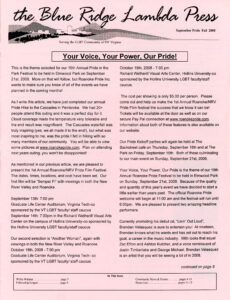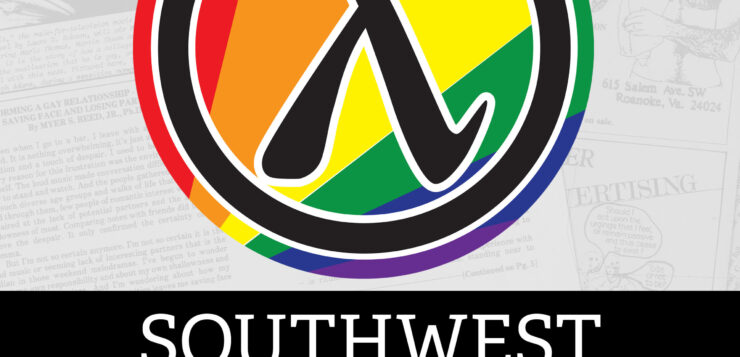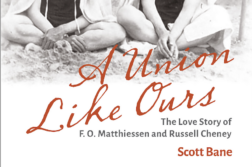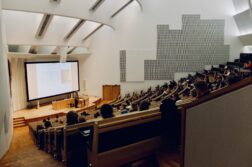
Those interested in learning more about what life was like for LGBTQ+ individuals at the end of the twentieth and beginning of the 21st centuries in rural Southwest Virginia will likely be pleased to hear that the region’s longest-running gay newsletter, Blue Ridge Lambda Press, is now fully digitized.
The digitization of the archive by the Southwest Virginia LGBTQ+ History Project is a significant contribution to the preservation of the local queer community. All 26 volumes, which encompass hundreds of issues, were made available last month through JSTOR.
The digitization process was no easy feat, and took five years to set up, and still has roughly another decade of newsletter digitization work ahead of it.. “This is a remarkable achievement. Digitization is a long process, involving multiple partners – in this case including Roanoke College and the Roanoke Public Libraries,” said Dr. Samantha Rosenthal, Associate Professor of History at Roanoke College and Co-Founder of the project.
The Blue Ridge Lambda Press was one of several LGBTQ+ newsletters produced in the area between the 1970s and early 2010s. The press grew out of the Blue Ridge Lambda Alliance, which formed around 1980 in Lynchburg—the home base of televangelist Jerry Falwell Sr. Rosenthal. The formation of the alliance can perhaps be viewed as a response to Falwell’s Moral Majority.
“For LBGT people, the only way they could communicate about local issues and activism was using newsletters,” Rosenthal said, regarding newsletter prevalence prior to the widespread adoption of the internet. “It filled a huge void for the region. It was the primary political voice for the western half of Virginia,” Rosenthal said.
The project is a community-based history initiative out of Roanoke College, committed to researching and telling the stories of LGBTQ+ individuals and organizations in the region. Megan Reynolds, a senior at the college and research fellow with the project, spearheaded the digitization effort. Every Friday afternoon for the past couple of years, she visited Roanoke Public Library’s History department to scan the issues. “The digitization of the Blue Ridge Lambda Press was the longest, ongoing project that I worked on in my four years with the History Project, which I find synonymous with the long run the newspaper itself had,” she said.
Being a Maine native and Gen Z-er, Reynolds found the newsletter quite interesting. She was surprised to learn from the archive just how vibrant the local LGBTQ+ community was decades earlier. “It wasn’t something everybody knew about. Especially at the beginning, people had to keep it that way because there was so much prejudice against gay people,” she said.

As part of the archive release, Reynolds reached out to Tommy Feazell. He regularly contributed to the newsletter, which he noted the local gay community referred to as the “Pink Pages” due to it being printed on bright pink paper for nearly twenty years. His monthly column was published under the name “Willie Waltzer.”
“My proudest accomplishment […] was writing my column about gay dating etiquette, life adventures, notable events in ‘the life of…’” he said. “It was an honor to reach out to my brothers and sisters in Roanoke and beyond. So many memories, joys, and heartaches, too. The [Blue Ridge Lambda Press] became a major lifeline for our gay community in the mountains of Virginia.”
Even those who don’t have a particular interest in the region will likely find that the newsletters make for an interesting read. Reynolds certainly feels that way. “As I spent hours scanning and uploading each individual issue, I had the opportunity to read every single page and to learn about anything and everything that was happening in the region’s queer community during that particular time,” she said.
One issue that stood out to her the most was from 1993, which focused on the March on Washington for Lesbian, Gay and Bi Equal Rights and Liberation. Seeing those in the LGBTQ+ community fight for many of the same rights that people are still fighting for today, especially resonated with her.
Looking back at the first and last issues of the newsletter is like emptying out the contents of a long-forgotten time capsule. It’s hard to deny that they are very much of their time, with references to classified pages in the first issue, and references to Zac Efron in the final issue.
The newsletter certainly changed with the times by expanding its demographic appeal. Despite the first Issue simply noting that it would publish things of interest to “gay men and lesbians, etc.,” later Issues embraced the “B” and the “T.”
“It changed over time. In the beginning, it was very much a gay and lesbian newsletter, but you started seeing references to transgender individuals and bisexual individuals. You start seeing how [they]were being incorporated into the LGBTQ community at the time,” Reynolds explained. “What they were publishing became more inclusive and more about bringing everyone together and fighting for everyone’s rights.”
The first issue spread the word that the Virginia Gay Alliance was attempting to sign up new members in the hopes of forming a local chapter in the Roanoke-Lynchburg area. The president of the alliance, Mike Romanello, is quoted as saying, “The ability to form a cohesive, aggressive, and effective gay political force is within our grasp.” He went on to stress, “Together, each of us, to whatever extent we are comfortable, can effect a change in Virginia which will be a milestone in the history of the gay rights movement.”
Regarding the formation of a gay political force, Reynolds noted that many of the issues that came out around elections contained information on gay-friendly politicians. Proof of that progress was made by the time the last Issue came out, which reported on preparations for Roanoke’s nineteenth annual pride event, including an announcement for an inaugural Pride film festival getting ready to launch.
Despite knowing the newsletter inside out, Reynolds isn’t sure why it ceased operation. “The last few volumes started to get very big. Each one was about twenty pages. Maybe people started losing interest in it. Maybe they were running out of money,” Reynolds said. “It just stopped. In the last issue there was a story that said it would be continued in the next issue, but there never was a next issue.”
With the newsletter now accessible online, Reynolds hopes others will continue to discover and enjoy the “Pink Pages.” “Knowing that my work to make the ‘Blue Ridge Lambda Press’ more accessible to the community will benefit future researchers and community members is why I do what I do,” Reynolds said.
Rosenthal agrees, noting that it’s an important part of the region’s history. “Newsletters like this are largely unknown to most people. They are largely not digitized across the country,” she said. “To have a 25-year newsletter is an incredible archive of 25 years of queer activism, organizing and community. It provides a basis for us to know a lot about what happened in this region and our communities. It gives us a deeper sense of place and belonging.”
 Aila Alvina Boyd is a Virginia-based award-winning journalist and educator. Her journalism can be found in a number of regional and national publications. She’s been teaching English on the college level for the past seven years. She earned her terminal graduate degree in writing from Lindenwood University.
Aila Alvina Boyd is a Virginia-based award-winning journalist and educator. Her journalism can be found in a number of regional and national publications. She’s been teaching English on the college level for the past seven years. She earned her terminal graduate degree in writing from Lindenwood University.






